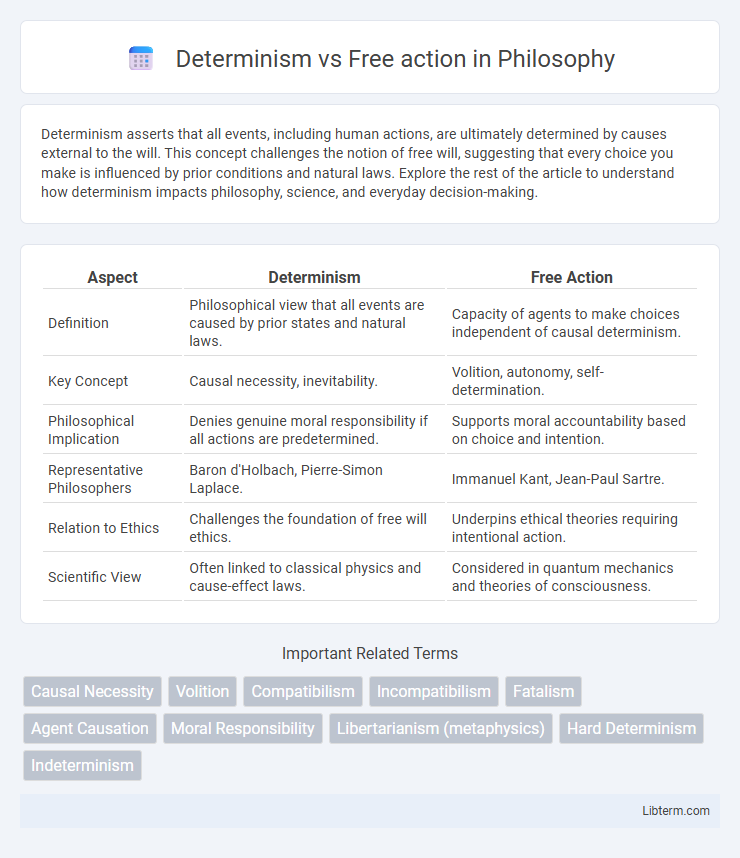Determinism asserts that all events, including human actions, are ultimately determined by causes external to the will. This concept challenges the notion of free will, suggesting that every choice you make is influenced by prior conditions and natural laws. Explore the rest of the article to understand how determinism impacts philosophy, science, and everyday decision-making.
Table of Comparison
| Aspect | Determinism | Free Action |
|---|---|---|
| Definition | Philosophical view that all events are caused by prior states and natural laws. | Capacity of agents to make choices independent of causal determinism. |
| Key Concept | Causal necessity, inevitability. | Volition, autonomy, self-determination. |
| Philosophical Implication | Denies genuine moral responsibility if all actions are predetermined. | Supports moral accountability based on choice and intention. |
| Representative Philosophers | Baron d'Holbach, Pierre-Simon Laplace. | Immanuel Kant, Jean-Paul Sartre. |
| Relation to Ethics | Challenges the foundation of free will ethics. | Underpins ethical theories requiring intentional action. |
| Scientific View | Often linked to classical physics and cause-effect laws. | Considered in quantum mechanics and theories of consciousness. |
Understanding Determinism: The Basics
Determinism asserts that every event, including human actions, is the inevitable result of preceding causes governed by natural laws. This philosophical concept challenges the notion of free action by suggesting that choices are predetermined and not genuinely autonomous. Understanding determinism involves analyzing causal chains and how they influence decision-making processes within a framework of necessity.
Defining Free Action in Philosophy
Free action in philosophy refers to the capacity of individuals to make choices unconstrained by external determinants or internal compulsions, emphasizing autonomy and intentionality. It involves agents possessing control over their decisions, enabling moral responsibility and accountability. This concept contrasts with determinism, which posits that every event, including human actions, is causally necessitated by preceding events or natural laws.
Historical Perspectives on Determinism and Free Will
Historical perspectives on determinism and free will trace back to ancient Greek philosophy, where Aristotle emphasized a balance between necessity and contingency in human actions. Stoic philosophers like Chrysippus advocated for determinism, asserting that all events are logically predetermined by fate. During the Enlightenment, thinkers such as Descartes and Kant redefined free will, emphasizing rational autonomy despite deterministic natural laws.
Key Arguments for Determinism
Determinism argues that every event, including human actions, is causally determined by preceding events and natural laws, eliminating genuine free will. Key arguments include the causal chain principle, which states that every decision is the inevitable result of prior causes, and the predictability argument, highlighting that behavior can be predicted if all conditions are known. Neuroscientific studies supporting brain activity preceding conscious decisions further reinforce determinism by questioning the existence of autonomous free actions.
Major Theories Supporting Free Action
Major theories supporting free action include Libertarianism, which argues that individuals possess genuine freedom to make choices independent of deterministic forces, emphasizing agent causation and moral responsibility. Compatibilism, also known as soft determinism, reconciles free will with determinism by defining freedom as the ability to act according to one's desires and intentions without external constraints. Another significant view is Agent-Causal Theories, proposing that agents themselves can initiate actions not wholly determined by prior events, preserving autonomy and accountability.
Compatibilism: Bridging Determinism and Freedom
Compatibilism asserts that free action can coexist with determinism by redefining freedom as the ability to act according to one's desires and intentions without external coercion. This philosophical position reconciles deterministic causality with moral responsibility, suggesting that agents remain free as long as their actions align with internal motivations and not compulsion. Key figures like Daniel Dennett emphasize that understanding mental states and causal chains allows for a nuanced view of autonomy within a determined universe.
Incompatibilism: The Case Against Reconciliation
Incompatibilism argues that determinism and free action cannot coexist because determinism entails that every event, including human decisions, is causally fixed, leaving no room for genuine free will. According to philosophers like Peter van Inwagen, if all actions are predetermined by prior states, moral responsibility is undermined, as individuals lack true control over their choices. This perspective challenges attempts at reconciliation by maintaining that either determinism is false and free will exists, or determinism is true and free action is an illusion.
Scientific Insights: Neuroscience and Human Behavior
Neuroscientific research reveals brain activity preceding conscious decision-making, challenging the notion of free will by suggesting deterministic neural processes underlie human actions. Studies using fMRI and EEG demonstrate predictive patterns in the prefrontal cortex before subjects report awareness of choices, implying unconscious mechanisms drive behavior. These scientific insights bridge cognitive neuroscience and philosophy, reshaping debates on autonomy, responsibility, and moral agency.
Ethical Implications of Determinism vs Free Action
Determinism challenges the concept of moral responsibility by suggesting that all actions are predetermined by prior causes, potentially undermining the justification for praise or blame. Free action supports ethical accountability, as individuals are seen as capable of making autonomous choices that merit reward or punishment. This debate influences legal systems, social policies, and personal responsibility frameworks by questioning whether individuals can be held morally liable for their behavior.
Contemporary Debates and Future Directions
Contemporary debates on determinism versus free action center on the compatibility of causal determinism with human agency, emphasizing advances in neuroscience that challenge traditional notions of free will. Recent discussions explore how quantum indeterminacy and probabilistic models may influence decision-making processes without fully granting libertarian free will. Future directions involve integrating interdisciplinary research from philosophy, cognitive science, and artificial intelligence to better understand the mechanisms underlying intentionality and moral responsibility.
Determinism Infographic

 libterm.com
libterm.com